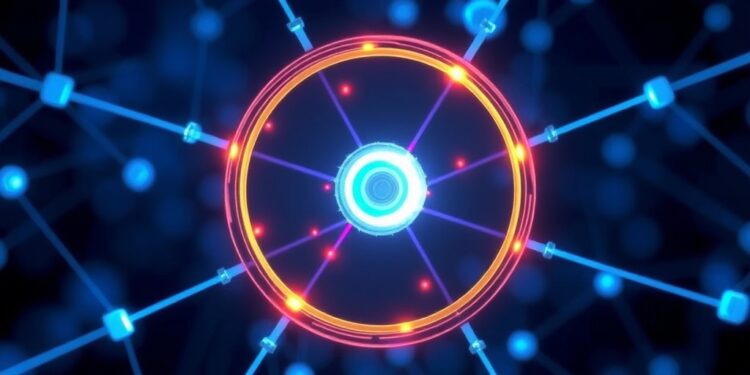In a groundbreaking study that promises to reshape the landscape of quantum technology, researchers from the Hebrew University of Jerusalem and Cornell University have uncovered new methods for effectively suppressing the decoherence of electron spins in alkali-metal gases. This research, published in the esteemed journal Physical Review Letters, demonstrates a significant breakthrough in how low magnetic fields can enhance the stability of spins, which are fundamental to quantum computing and quantum sensing technologies. This finding is poised to unlock innovative applications in quantum sensors, atomic clocks, and more, marking a pivotal point in the development of reliable quantum systems.
Electron spins, the tiny magnetic properties intrinsic to atoms, are vital for storing and processing information in quantum systems. They hold the potential for revolutionary advancements in technology, but they are notoriously susceptible to decoherence. Decoherence refers to the loss of quantum information due to interactions with the environment, which often leads to a degradation in spin coherence and, consequently, the collapse of their useful quantum states. This phenomenon arises primarily from interactions with other particles or when absorbing light of certain frequencies. Therefore, improving the coherence of these spins has long been considered a key challenge in the pursuit of stable quantum technologies.
The pioneering research led by Mark Dikopoltsev and Avraham Berrebi, under the guidance of Professors Uriel Levy and Or Katz, delves deeply into the factors affecting spin decoherence. Hot cesium atoms were the focus of the team’s exploration, as they are particularly vulnerable to losing coherence due to spin-rotation interactions encountered during collisions with nitrogen molecules. These collisions, along with interactions occurring through absorption of near-resonant light, create substantial interference that can lead to rapid decoherence. The ability to mitigate these effects could greatly enhance the performance and reliability of quantum devices.
One of the key revelations of their study is the observation that low magnetic fields can achieve an order-of-magnitude reduction in spin relaxation rates. Traditionally, it has been understood that magnetic fields primarily serve to preserve spin coherence. However, this research suggests that weak magnetic fields can actively suppress not only the decohering processes stemming from random interactions but also those that directly relax the spins themselves. The implications of this finding extend beyond merely enhancing coherence; they provide researchers with a powerful new tool for controlling quantum states.
This novel approach to spin control fundamentally alters our understanding of spin dynamics. The use of low magnetic fields as a stabilizing force opens up avenues for more nuanced control over quantum states in hot atomic vapors, paving the way for advancements in several fields that depend on maintaining long coherence times. Applications of these findings can range from the development of highly accurate atomic clocks with improved precision to enhanced quantum memory systems that can store information for longer durations without loss.
The significance of the study lies not only in its technical achievements but also in the potential it holds for real-world applications. Enhancing spin coherence through low magnetic fields could lead to more reliable quantum sensors that can detect minute changes in the environment, which would have profound implications in fields such as navigation, geological exploration, and even medical imaging. Furthermore, the improved stability of atomic clocks can revolutionize global positioning systems and telecommunications by providing more accurate time references.
The collaborative nature of this research, merging the expertise of institutions like the Hebrew University and Cornell University, exemplifies the importance of interdisciplinary teamwork in advancing quantum technologies. The findings presented in Physical Review Letters are expected to stimulate further research and innovation in the domain of quantum physics, inspiring scientists and engineers to build upon these discoveries and explore new strategies for manipulating quantum systems.
As the researchers continue to investigate the implications of their findings, the vision for a future where quantum technologies become integral to everyday life seems increasingly tangible. The pathway to exceptional advancements in various applications, driven by the enhanced coherence of electron spins, is illuminated by this work. It serves as a vital step toward realizing the full potential of quantum information science and harnessing its capabilities for transformative technologies.
The study of spin decoherence and its control is expected to influence various scientific endeavors, ranging from fundamental physics experiments to the creation of commercial quantum devices. As knowledge in this field expands, researchers aim to unravel more complexities associated with spin interactions and develop methodologies that can effectively employ magnetic fields for greater control over quantum states.
In conclusion, the findings from the Hebrew University and Cornell University signify a noteworthy advancement that could contribute to a new era of quantum technologies. The ability to suppress electron spin decoherence with low magnetic fields unlocks a myriad of possibilities for improving the performance and reliability of quantum systems, simplifying the journey toward a future dominated by advanced quantum information technologies.
Subject of Research: Spin decoherence suppression in alkali-metal gases
Article Title: Suppressing the Decoherence of Alkali-Metal Spins at Low Magnetic Fields
News Publication Date: 7-Apr-2025
Web References: http://dx.doi.org/10.1103/PhysRevLett.134.143201
References: Physical Review Letters
Image Credits: Not applicable
Keywords
Quantum information science, Electron spin, Quantum decoherence, Magnetic fields




